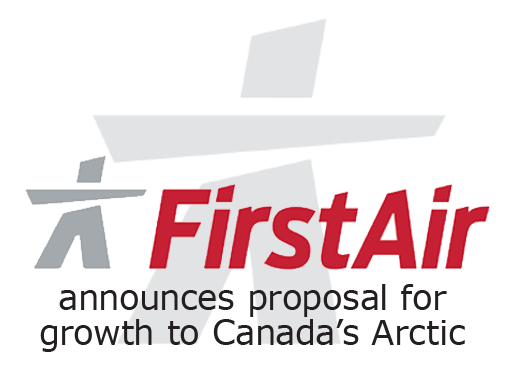In partnership with The Ottawa Airport Authority and Aeroterm, First Air has submitted two separate applications to the National Trade Corridors Fund (NTCF). This Government of Canada program was announced mid-2017 to provide funding for infrastructure projects that help support the flow of goods and passengers throughout the transportation system by reducing bottlenecks and addressing capacity issues. Ensuring that Canada’s northern communities benefit from these important infrastructure projects was identified as an important priority for the NTCF.
First Air, a wholly Inuit-owned airline, is a vital link in the supply chain to the North; in the past year, First Air shipped an incredible 19.4 million kilos of cargo freight out of Ottawa to Canada’s Arctic communities, including food, mail, medical supplies and other goods. (First Air is 100% owned by Makivik Corporation, representing the Inuit beneficiaries of the James Bay and Northern Quebec Agreement.) With cargo demands expected to increase by 28% over the next five years, First Air needs to ensure capacity exists at both ends of the process to support this growth.
The first proposal addresses capacity issues at First Air’s cargo facilities in Ottawa, which are located on the grounds of the Ottawa International Airport, by increasing warehousing and refrigeration capacity and modernizing technology aimed at reducing spoilage and delayed shipments. In keeping with Canada’s focus on transportation security, the expansion would ensure compliance with federal security screening requirements.
In support of the project, the Ottawa Airport Authority proposes to realign Alert Road to facilitate an expansion of First Air’s existing maintenance hangar to the east. Aeroterm, the managing partner of Ottawa’s FedEx shipping operation, would take over First Air’s existing cargo warehouse to expand its facilities.
Brock Friesen, President and CEO of First Air, said, “We want to ensure that we not only meet the growing cargo demand of Canada’s Arctic, but that we also continue to provide the best service possible in doing so. The Arctic communities depend on us on a daily basis, every day of the year. We take this role very seriously and are committed to modernizing our facilities to optimize service to the North.”
“As a key gateway into Canada’s Arctic, the Ottawa International Airport Authority is acutely aware of the importance of First Air’s ability to meet the growing demand for the movement of people and goods to the North,” said Mark Laroche, President and CEO of the Ottawa International Airport Authority. “This application not only meets the spirit of the National Transportation Corridors Fund, it will also make a meaningful difference to communities and individuals in Canada’s North who will benefit from increased availability and lower prices for goods, and we look forward to the federal government’s favourable consideration.”
The application, which requests half of the $17.5 million dollar project, could commence as early as 2018 with the realignment of Alert Road and would continue through to 2020/2021 with construction of the new cargo facilities.
The second and separate proposal pertains to an expansion project for First Air’s Iqaluit Cargo facilities. As the Eastern Arctic hub, the expansion would facilitate the distribution of goods to more than 11 smaller Nunavut communities. The expansion would include construction of a larger warehouse to aid in ensuring the uninterrupted delivery of critical freight. This new facility would also include enhanced inventory management and delivery standards through increased refrigeration capacity and new radio frequency identification (RFID), as well as the integration of Green technology into the design of the structures to maximize energy conservation.
First Air is the largest freight service provider to Arctic communities; the project in Iqaluit is proposed at a cost of $17 million dollars and is looking for a start date in 2018 if funding approvals are obtained.


 1-866-985-9780
1-866-985-9780